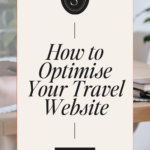
SEO Guide: How to Optimise Your Travel Website
Table of Contents
ToggleSharing is caring!
Reading Time: 3 minutes


Travelling is fun, and so is documenting the experience through blogging. The plus side to travel blogging is that you get to earn money while during something you're genuinely passionate about!
But more than simply blogging about your experiences, you should optimise your travel website to attract readers. Any business, no matter the size, needs strategic SEO to top the searches. By implementing SEO strategies, your travel website will reap the following benefits:
- Improved brand visibility
- Increased organic traffic
- Increased ROI
- Attract potential clients
- Strengthens your position as an influencer
How to optimise your website for SEO? What steps should you take to drive more traffic to your blog site and achieve your dream of becoming an influencer? Here are some tips:

How to Optimise Your Travel Website
How should you implement SEO for your travel website? The goal is to meet the demands of both the core audience and search engines. Here are some ideas:
Speed Up Loading Time
Did you know that Google prioritises websites with short loading times? That's how vital loading time is to SEO. The window for attracting readers is tight, too – your site should load in a fraction of a second because Google recommends a loading time of 3 seconds.
Slow loading times increase a website's bounce rate – the number of users who navigate away from the site – by 123%. For fast loading speeds, always compress your visuals and conduct site audits to determine what areas of your site should be improved to achieve quick loading.
Implement Voice Search
Search shows that 71% of users prefer to use AI voice assistance when searching for infos online because it's convenient and hands-free. To optimise your travel site for voice search, develop a structured data optimisation strategy such as using voice-based keywords and a mobile-friendly design
Use Tourism-based Keywords
Optimise your content with tourism-based keywords because most users key in precise terms when conducting research online. Insert the keywords in your blog posts, social media posts, GMB posts, LinkedIn posts, etc. This way, your content and social media will top the searches whenever a user searches for specific places online.
Of course, it's just as important to define the intent behind every keyword you use to get the best results. Think of tourism-based keywords that your target audience will likely use, then analyse these keywords for search volumes on your competitors' sites. Use keyword research tools to choose the best keywords (medium to low competition), then map each keyword into specific pages and content on your website.
Work on your credibility
It's essential to put out trustworthy, relevant content, and it's equally vital to be perceived as an expert in your field. All these factors will affect your SEO. Google's own quality rating guidelines measure a website's credibility through expertise and authoritative and trustworthy content. A site with a low credibility rating in Google's eye will be sandboxed, while trustworthy content goes higher in the searches.
Avoiding duplicated content, optimising your page titles and meta tags, and preventing broken links are just a few ways to boost your website's authority. It's essential to conduct deeper research before developing content, maintaining consistency and relevance across all channels, and aligning your content with your business goals to get better results.
Conduct Link Buildin
External links are URLs that lead from your site to another for reference, while internal links lead to other website pages. Do not misuse or overuse link building to avoid a negative impact on your travel website.
When building links, use links from reputable domains and always check the PageRank of every site. The higher the PageRank, the better. Relevance is just as important; the URLs on a blog post should always follow the idea of the content. For good measure, add some do-follow and no-follow links. Feel free to use different page ranking tools to determine the quality of every URL you insert into your travel blog.
Implement local SEO
Schema markup is the language that user engines use to characterise and categorise content on web pages. A search engine needs to analyse your website content properly to get the best results in your SEO campaign. Implementing local SEO along with schema markup will increase your online visibility exponentially.
Check out Google My Business (GMB) and claim your website/business. Add your blog infos to achieve higher rankings. Add your website to local directories, create social media profiles and use your primary keywords to increase your online visibility.
And there you have it, the most effective ways to optimise your travel website! When developing an effective SEO strategy, always consider the quality and relevance of every post you publish. Using attractive, compressed images and the best keywords helps boost your search rankings even further.
Most Popular Posts:
Sharing is caring!
[…] defined internal link structure allows SEO juice to flow naturally on your website. This helps users navigate your content seamlessly. This […]